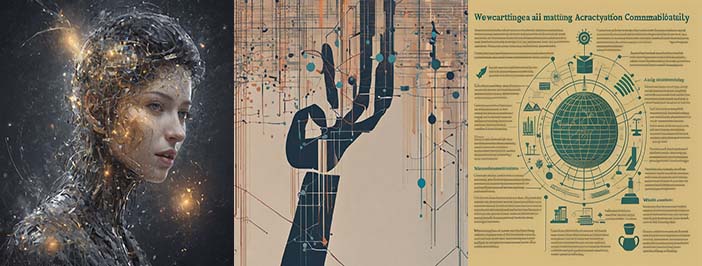
What We already Know: Generative AI and the History of Writing With and Through Digital Technologies
Anthony T. Atkins University of North Carolina Wilmington
Colleen A. Reilly, University of North Carolina Wilmington
Introduction
As Johnson (2023) recently reminded writing faculty, computers and writing/digital rhetoric scholarship, pedagogy, and experience have prepared us for teaching with developing technologies—AI presents a new challenge but not one that should cause us panic. After all, as Johnson and Agbozo (2022) emphasize, faculty "have been using technology to teach, critique, and remediate the writing process for more than one hundred years" (p. 158). We have a rich scholarly tradition that demonstrates basic principles, including that all technologies are political and rhetorical and that "policing is not pedagogy" (Johnson, 2023, p. 172). In 1999, at another pivotal moment in the history of teaching with web and digital composing technologies, Selfe admonished all writing faculty to pay attention to and interrogate the use and construction of technologies because failing to do so allows the social inequities they exacerbate to go unchallenged. Many scholars embraced that perspective and examined writing and communication technologies in terms of their construction, labor implications, and ethical ramifications. Based in this extensive scholarly tradition, our chapter highlights some of the strategies scholars have already developed to work with digital technologies, however new and powerful, to enhance our writing pedagogies and prepare our students for all contexts. We argue that we have access to the most qualified scholars to address the challenges of AI because they recognize solutions to conundrums presented by previously developed digital platforms and tools.
To this end, our chapter focuses on three central themes present in the literature that we saw as most generative when grappling with AI. These themes include the challenges posed to our conceptions of writing and authorship; the access and accessibility implications of information and communication technologies; and the degree to which technologies reveal and mask their mediation of content. Our chapter draws upon only a small amount of the wealth of scholarship from the corpus related to computers and writing and digital rhetoric; we selected texts that most resonated with our focus, knowing that full coverage was not feasible. Additionally, our chapter addresses only the text generation type of AI, specifically chatbots, while acknowledging that many other types exist that create visual, audio, and multimedia compositions. Our discussion is enhanced by short video responses that we integrated into our chapter that provide four scholars' responses to this question: What are the central lessons that our field of computers and writing learned in working with past digital technologies that can best prepare us to assist our faculty and students when composing with generative AI? As these videos illustrate, our field has a wealth of relevant knowledge to draw upon and this knowledge continues to grow and inform how we as scholars and faculty navigate researching, writing, and teaching with AI.
Video Transcript
| Laura: Hey there. I've been asked to respond to the question "What are the central lessons that our field of computers and writing learned in working with past digital technologies that can best prepare us to assist our faculty and students when composing with AI?" |
| Laura: As I think about what we've learned in the past, we've found that with new technologies sometimes people are really excited about them. We also have people who are in the middle and welcome to take them on once someone else shows them something. And then we've got people who wait until the last minute because they're not sure of it. They feel like things are going to change so much for them. They just don't know how to use it, that sort of thing. |
| Laura: I think that these lessons of adaptation are important because it helps us to understand where people's fear might be coming from or their reluctance or their discomfort. And addressing those concerns is one of the first things that we need to do in order to help both faculty and students feel comfortable with this new technology that AI is. It has the opportunity and the ability to really revolutionize some of the things that we're doing with education. |
| Laura: So the idea of moving from a product to the process of getting to the product: how do students figure out what their final thing, whatever that thing is going to be, is going to look like? How do faculty re-envision what their assignments might look like in order to get students to think through that process more clearly? |
| Laura: We can also think about what things like transformative learning help us to understand about the learning process. So what becomes important to students in the journey of learning and helping students to understand why the journey of learning is important, why knowledge still matters in the age of AI, why learning still matters in the age of AI. And I think as we put all of these things together, then we can start to see a pathway forward where we rethink what we've been doing in the classroom. We help students to understand this rethinking. |
| Laura: Perhaps we move a little bit more away from grades of absolutes. Yes or no? You've gotten this right and start to think more about, okay, you didn't get it right this time, but how can we come back to this again? Or the AI helped you here, let's make sure that you still understand the concepts because you're going to need them in a class further down the road or in your work. |
| Laura: So yeah, things are going to change a little bit. And I think it's exciting for a lot of people. It's also still scary for a lot of people. And as we realize the emotional toll that these changes can take on people, then we have the opportunity to work with faculty and students to help everybody move into this new technology with maybe a stronger degree of comfort than they might have had if they just had to do it on their own. |
